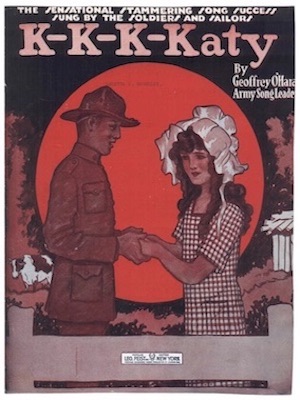
K-K-K-Katy
Live Version
Studio Version
Sheet Music
Student Essay
The Fluency of Stammering Songs
Stuttering is a speech disorder in which a person’s speech pattern is disrupted by involuntary repetitions of sounds, syllables, or words. While there are many occasions when a person may struggle to find their words, this is inherently different from the actual disability that causes discomfort among those who stutter uncontrollably. But the conflation of these two scenarios was a common recurring rhetorical device in early-twentieth-century comedy sketches, cartoons, and song lyrics that inaccurately linked stuttering to nervousness or foolishness. The trope of the stuttering love confession was so popular in twentieth-century song lyrics that musicologists recognize “stammering songs” as a legitimate subgenre of American popular song. Stammering songs almost always depict a man who stutters out of nervousness around the woman he loves. The most famous stammering song, “K-K-K-Katy,” by a vaudeville star named Geoffrey O’Hara tells the story a soldier attempting to confess his love to a woman before he goes off to war. Songs like “K-K-K-Katy” document cultural anxieties and discourses about disabilities in American public discourse, and while we can interpret songs like these as opportunities for soldiers to laugh and escape the terrifying reality of war, it is important to remember that the increased popularity of stammering songs came at the time when stuttering and other speech disorders were increasingly exhibited by soldiers who experienced shell shock.
Additionally, stammering songs from this time period reflect heightened attention to English language fluency in American culture as a marker of normalcy and belonging. The United States admitted over 14 million immigrants between 1900-1920, mostly from Southern and Eastern Europe, and brewing concerns about the impact of mass immigration and the ability of non-English speakers to assimilate triggered anti-immigrant nativism that we hear reflected in Theodore Roosevelt’s 100% American speeches, and see in the rise of the Ku Klux Klan. Although these developments are not directly referenced in the lyrics to "K-K-K-Katy," we should not dismiss the possibility that this song was understood by against this political backdrop. The genre of stammering songs illustrates how popular music developed parallel to American identities during the early twentieth-century.
The musical and lyrical analysis of “K-K-K-Katy” by Geoffrey O’Hara and “Oh Helen” by Arthur Field highlight the entertainment trends and audience attraction to stammering songs. In examining the musical components in both of these examples, the effect of stutter was created by the sound of both the singer and the piano. With “K-K-K-Katy”, each time a syllable like “K” is repeated in the chorus to imitate the stuttered sound, “the melody shifts to a triplet figure before returning to the quarter-note beat” which makes it a catchy tune (Lerner and Straus 2006, 94). Interestingly, Lerner and Straus continue to observe that not only the piano or the singer playing the role of a stuttering man but the entire assembly of spectators at the music hall would join in for the chorus and normalize the disability to a lighthearted event where it unifies performers and listeners (98). The choice of diction is also intentional. By analyzing the lyrics, we can see the songwriter’s intention in capturing the entertainment trend based on what attracted the audience:
“K-K-K-Katy, beautiful Katy, you’re the only g-g-g-girl that I adore.
When the m-m-m-moon shines, over the cowshed,
I’ll be waiting at the k-k-k-kitchen door.”
The popular stammering song “K-K-K-Katy” uses the repetition of syllable “K” to lyrically put a beautiful girl’s name, Katy, next to KKK, a White Supremacist organization. The Ku Klux Klan, or KKK, was revived in 1915 to promote the ideology of 'Americanism' and extended its movement against any "un-American" groups such as African Americans, Roman Catholics, Jews and immigrants (Brown 2006). The resurgence of the KKK coincided with the anti-immigrant and anti-radical movements in the 1920s that were widespread in the nation. The KKK and its followers were extreme protectors of the notions of patriotism and loyalty to the country and promotors of its traditions and customs without foreign influences (Brown 2006). This contemporary context draws listeners’ attention to those repeated words and the meaning they might convey. After all, the comedic device of stammering songs brings out laughter while the lyrics contain a potentially divisive effect from this comic novelty song. Aside from those suffering from stutter, how can a group like African Americans sing along to a song that would potentially provoke pain and terror?
Another stammering song “Oh Helen” by Arthur Field in 1918 attracted lots of audiences' attention on the repetitive profanity words in the chorus like “hell”, “f-f-f” or “damn” which is the common daily humor that many American audiences can relate to:
“Oh H-H-Hel, Oh H-H-Hel, Oh Helen please be mine
Your f-f-feat, your f-f-feat, your features are divine,
I s-s-swear, I s-s-swear, I swear I will be true,
Oh D-D-Dam, Oh D-D-Dam, Oh Damsel I love you.”
Putting a woman’s name- Helen next to the profanity word- hell creates the same ironic combination that gives a stammering song its comedic effect. In both of these examples, the stuttering makes the male characters anxious, unconfident and almost foolish, proving the case that stammering songs aren’t accurately representing the real disability but used the stutter as a comic relief or an important narrative device in conveying the context of social anxiety in American society.
Related Resources
Crawford, Richard. “After the Ball: The Rise of Tin Pan Alley.” In America’s Musical Life, 471-493. New York: W.W. Norton, 2001.
Eksteins, Modris. “The Cultural Legacy of the Great War.” In The Great War and the Twentieth Century, edited by Jay Winter, Geoffrey Parker, and Mary R. Habeck, 331-350. New Haven: Yale University, 2000.
Hill, Kathryn. "'To f-f-f-ade away?': The blues influence in Pete Townshend's search for an authentic voice in 'My Generation'." Popular Music History 9, no. 2 (August 2014): 111-135.
Holman, Valerie, and Debra Kelly. "Introduction. War in the twentieth century: the functioning of humour in cultural representation." Journal of European Studies 31 (2001): 247-263.
Johnson, Jeffrey K. "The Visualization of the Twisted Tongue: Portrayals of Stuttering in Film, Television, and Comic Books." Journal Of Popular Culture 41, no. 2: 245-261.
Lerner, Neil William, and Joseph Nathan Straus. Sounding Off: Theorizing Disability in Music. New York: Routledge, 2006.
Lipsitz, George. “This ain't no sideshow”: Historians and media studies.” Critical Studies in Media Communication 5, no. 2 (1988): 147-161.
O’Hara, Geoffrey. "K-K-K-Katy." New York: Leo Feist Inc, 1918.
Garland-Thomson, Rosemarie. "Disability Studies: A Field Emerged." American Quarterly 65, no. 4 (2013): 915-926. doi:10.1353/aq.2013.0052.
Straus, Joseph N. "Normalizing the Abnormal: Disability in Music and Music Theory." Journal of the American Musicological Society 59, no. 1 (2006): 113-84. doi:10.1525/jams.2006.59.1.113.
Winter, Jay. “Remembering War: The Great War between Memory and History in the Twentieth Century.” In The Collective Memory Reader, edited by Jeffrey Olick, Vered Vinitzky-Seroussi, and Daniel Levy, 426-429. New York: Oxford University Press, 2011.
Written by
Ky Nguyen is a student researcher with the ReSounding the Archives project at the University of Virginia. She is majoring in biology and is following her dream to one day become a pediatrician. ReSounding the Archives is a valuable experience for her to gain skills in researching and presenting her analysis of sheet music.
Song Information
Recording Information
Performers

Crystal Golden, Soprano, is a Masters student in Vocal Performance at George Mason University, studying with Professor Patricia Miller, Distinguished University Professor and Director of Vocal Studies at GMU. She has won First-Place at several state and regional competitions, and has performed major operatic roles both at GMU and internationally (Amalfi, Italy). As an academic scholar, Golden has received numerous awards in academic achievement, has studied abroad at University of Oxford, and holds membership in both Phi Kappa Phi and Phi Beta Kappa, the nation's oldest, most prestigious academic honor society.

Estrella Hong is currently a doctoral student in piano performance and serves as a graduate teaching assistant at George Mason university under the tutelage of Dr. Monson. She studied piano at the National Conservatory in Buenos Aires, Argentina as a young pianist. Additionally, she graduated with Biochemistry degree at UCLA and assisted various research projects in Whitesides lab at Harvard University.
Live Version

Eli Stine is a composer, programmer, and educator. He is currently pursuing a Ph.D. in Composition and Computer Technologies as a Jefferson Fellow at the University of Virginia. Stine's work explores electroacoustic sound, multimedia technologies (often custom-built software, video projection, and multi-channel speaker systems), and collaboration between disciplines (artistic and otherwise).
Studio Version



Song Transcription
[Verse 1]
Jimmy was a soldier brave and bold
Katy was a maid with hair of gold,
Like an act of fate, Kate was standing at the gate,
Watching all the boys on dress parade.
Jimmy with the girls was just a gawk,
Stuttered every-time he tried to talk,
Still that night at eight, he was there at Katy’s gate,
Stuttering to her this love sick cry.
[Chorus x2]
“K-K-K-Katy, beautiful Katy,
You’re the only g-g-g-girl that I adore;
When the m-m-m-moon shines, over the cow shed,
I’ll be waiting at the k-k-k-kitchen door.”
[Verse 2]
No one ever looked so nice and neat,
No one could be just as cute and sweet,
That’s what Jimmy thought, when the wedding ring he bought,
Now he’s off the France the foe to meet.
Jimmy thought he’d like to take a chance,
See if he could make the Kaiser dance,
Stepping to a tune, all about the silv’ry moon.
This is what they hear in far off France.
[Chorus x2]